
October

DAVID CUMMINGS BEM introduces CLIVE JONES
MOTHS
Introduction
I have invited local moth expert Clive Jones to contribute an article about Moths at Hockenhull Platts for this months Wildlife Watch. Clive has conducted several excellent moth studies in the local area. The one he carried out at the local allotments was extremely interesting, and very revealing to the people who garden there. So I thought it appropriate for him to tell us about his study of moths at Hockenhull, an area I know well, but not about the mysterious world of “Lepidoptera”. I hope you will enjoy his writing and his excellent photographs.
David Cummings
Winter, spring, summer or fall… moths through the seasons at Hockenhull Platts
I’m currently towards the end of two years of moth-hunting at Hockenhull Platts. I use battery powered light traps, setting them in the evening and returning to record and then release the moths next morning. If, like Wizzard, you ‘wish it could be Christmas everyday’ then perhaps ‘mothing’ is for you – opening the trap in the morning is like a childhood Christmas – always the chance of something new and exciting (though sometimes just the mothy equivalent of a pair of socks). Many people are surprised that moths are on the wing in winter. Male Winter Moths can often be seen fluttering in the car headlights during the colder months but the females are flightless, with only vestigial wings. This characteristic is shared with several other winter-flying species, including the well-named Dotted Border and the Mottled Umber. I’ve yet to find any of these flightless females at Hockenhull, but I have seen them elsewhere. They lay their eggs in bark crevices, the caterpillars emerge in spring and feed on new leaves of the same tree or disperse by ‘ballooning’ – paying out threads of silk which catch the wind, just as some spiders do. Given their colour schemes, I suspect that these, and other moths, may well spend the daylight hours among leaf litter on the woodland floor, perhaps relying on their camouflage only if uncovered by fossicking Blackbirds or other potential predators.
Spring brings other, often more colourful, moths. Some, like Red-green Carpet and Herald, hibernate as adults, emerging to lay their eggs as days lengthen and temperatures rise. The Herald can be seen feeding on ivy flowers and over-ripe berries in autumn, then overwinters in caves, lofts and outbuildings – I’ve found up to thirty at a time in one of the caves along the Sandstone Trail, but who knows where the Hockenhull Heralds spend their winters? The vivid Ruby Tiger overwinters as a caterpillar, while Poplar Hawk-moths, abundant at Hockenhull thanks to the poplar plantation, winter as pupae, underground. A favourite spring moth is the flamboyantly fluffy Pale Tussock. The phrase ‘often found at rest by day’ crops up in moth books more often than I ever find moths this way, but the Pale Tussock does live up to the billing – I’ve found it several times ‘at rest’ – and it also has a wonderful caterpillar, not uncommon in gardens, which used to be called a Hop-dog by hop-pickers.
Summer is the season for the greatest number of moths, none more spectacular than the Garden Tiger, which used to be common just about everywhere, but which has declined dramatically in recent decades; I’ve caught several at Hockenhull, so hopefully this is a local stronghold. The chunky Drinker is a frequent visitor to the traps in summer, I see the caterpillars quite often, and this year I found a batch of the very distinctive eggs. Occasionally I’m lucky enough to simply happen across moths in completely natural situations – two that spring to mind are Bordered Beauty and Gold Swift, both of which I’ve twice found among the vegetation. Moths are well known for the ability of males of some species to detect pheromones released by females over substantial distances; synthetic pheromones can be used to monitor moth species which don’t come to light. One such which I’ve found at Hockenhull is the Lunar Hornet Moth; a large and active insect which, though not a totally convincing replica of a Hornet, is nevertheless disconcerting at first sight.
As summer gives way to autumn, some moths, including the Canary-shouldered Thorn, are ideally coloured to match the turning leaves. For many moth enthusiasts the moth of autumn is the charmingly named Merveille du Jour, with its suit of lichen colours. Another autumn beauty is the Green-brindled Crescent, well-camouflaged on lichen-speckled bark; in closeup it makes an ideal subject to show the overlapping scales of different sizes and shapes which cover moths’ wings and bodies. Space allows mention of just one more species, the December Moth, which shows that months in moths’ names are an unreliable guide to when they can be seen – this one is on the wing from early October and is most abundant in November, but it certainly looks well-dressed for the colder weather. Thanks to Jack Helsby, Senior Living Landscapes Officer with Cheshire Wildlife Trust, for permission to trap on the Reserve. If you would like to see more of the moths (and some other invertebrates) from Hockenhull Platts please feel free to explore my albums by clicking the button below.
Clive Jones
-

Winter Moth
-
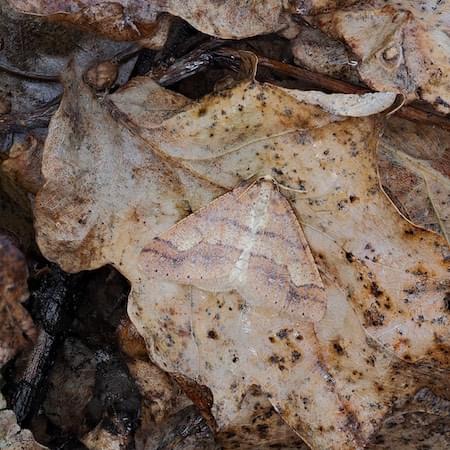
Dotted Border
-

Mottled Umber male
-

Mottled Umber female
-

Red-green Carpet
-

Herald
-

Ruby Tiger
-

Poplar Hawk-moth
-

Pale Tussock
-

Pale Tussock caterpillar
-

Garden Tiger
-

Drinker Moth
-

Drinker Moth caterpillar
-

Drinker Moth eggs
-
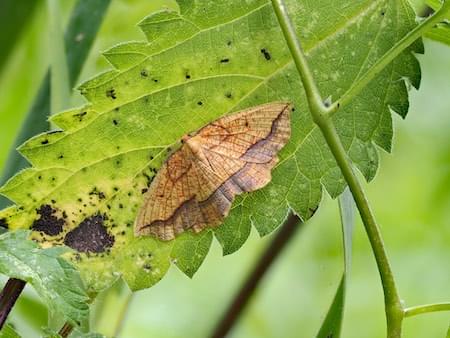
Bordered Beauty
-

Gold Swift
-

Lunar Hornet Moth
-

Canary-shouldered Thorn
-

Merveille du Jour
-

Green-brindled Crescent
-

Green-brindled Crescent detail
-
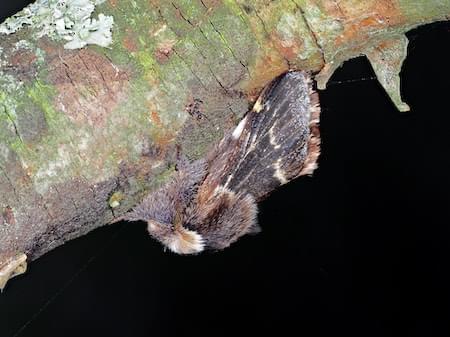
December Moth
-
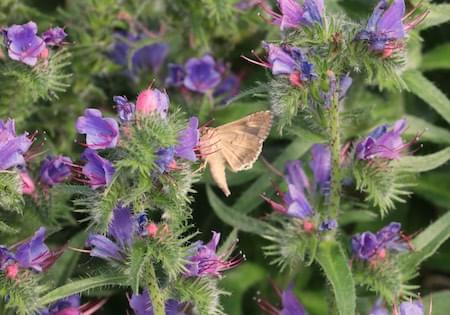
Day flying moth at Lindisfarne Aug 2023 Silver Y
-

Moth at Lindisfarne 2023 Silver Y
-

Moth at Lindisfarne Silver Y
-

Moth at Lindisfarne 2023 Silver Y
-

Moth at Lindisfarne 2023 Silver Y
-

Humming Bird Hawk Moth
-

Moth at Lindisfarne 2023 Gold Spot
-

Elephant hawk moth Begelly Pembrokeshire
-

Elephant hawk moth at Waverton
-

Elephant Hawk Moth at Waverton
-

Elephant hawk moth Waverton
-

Catterpillar France Alps Emperor Moth
-
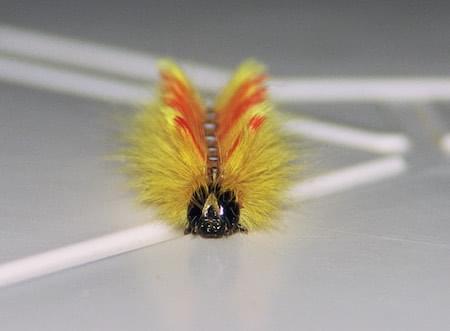
Pine Moth France Alps Sycamore Moth
-

Moth Tiger French alps Jersey Tiger
-

Tiger Moth Pembrokeshire Garden Tiger
-

Scarlet garden tiger moth Rowton 2023
-

Catterpillar Pembrokeshire Cliff Path
-

Catterpillar Pembrokeshire Cliff Path Lackey
-

A41 Vicars Cross Road verge Spindle Ermine
-

A41 Vicars Cross Verge.JPG
-

Burnet Moth
-

2Burnet moth
-
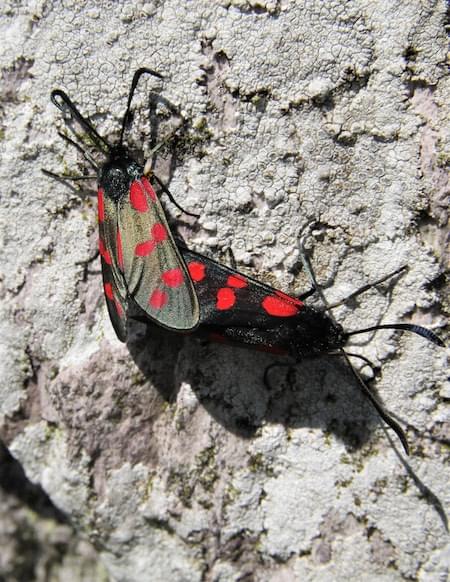
Burnet Moth
-

Burnet moths
-

Cinnabar moth
-

Catterpillar at Hockenhull Drinker
-

Catterpillar at Hockenhull Oak Eggar
-

Catterpillar at Hockenhull Garden Tiger!
-

Catterpilar at Hockenhull 2023 Drinker
-

Catterpillars Lackey
-

Vacated Burnet moth cocoon.JPG




















































